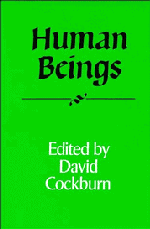Book contents
- Frontmatter
- Contents
- Introduction
- Machines as Persons?
- The Importance of Being Human
- Response to McNaughton
- Response to Diamond
- Real Selves: Persons as a Substantial Kind
- Personal Identity and Brain Transplants
- Personal Identity and the Idea of a Human Being
- Imagination and the Sense of Identity
- Radical Critique, Scepticism and Commonsense
- Getting the Subject back into the World: Heidegger's Version
- Incarnational Anthropology
- How Many Selves Make Me?
- Sartre and Our Identity as Individuals
- Bibliography
- Notes on Contributors
- Index
The Importance of Being Human
Published online by Cambridge University Press: 05 February 2015
- Frontmatter
- Contents
- Introduction
- Machines as Persons?
- The Importance of Being Human
- Response to McNaughton
- Response to Diamond
- Real Selves: Persons as a Substantial Kind
- Personal Identity and Brain Transplants
- Personal Identity and the Idea of a Human Being
- Imagination and the Sense of Identity
- Radical Critique, Scepticism and Commonsense
- Getting the Subject back into the World: Heidegger's Version
- Incarnational Anthropology
- How Many Selves Make Me?
- Sartre and Our Identity as Individuals
- Bibliography
- Notes on Contributors
- Index
Summary
I want to argue for the importance of the notion human being in ethics. Part I of the paper presents two different sorts of argument against treating that notion as important in ethics.
A. Here is an example of the first sort of argument.
What makes us human beings is that we have certain properties, but these properties, making us members of a certain biological species, have no moral relevance. If, on the other hand, we define being human in terms which are not tied to biological classification, if (for example) we treat as the properties which make us human the capacities for reasoning or for self-consciousness, then indeed those capacities may be morally relevant, but if they are morally significant at all, they are significant whether they are the properties of a being who is a member of our species or not. And so it would be better to use a word like ‘person’ to mean a being that has these properties, to bring out the fact that not all human beings have them and that non-human beings conceivably might have them.
The argument can be given without specifying the properties that are morally relevant; and people who accept an argument of this sort can differ enormously among themselves about which properties are morally important. But here is an example of what people who accept the argument have in mind.
- Type
- Chapter
- Information
- Human Beings , pp. 35 - 82Publisher: Cambridge University PressPrint publication year: 1991
- 47
- Cited by

